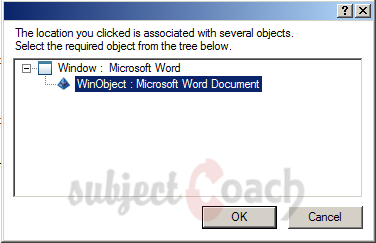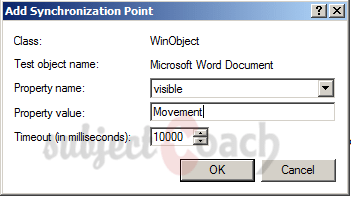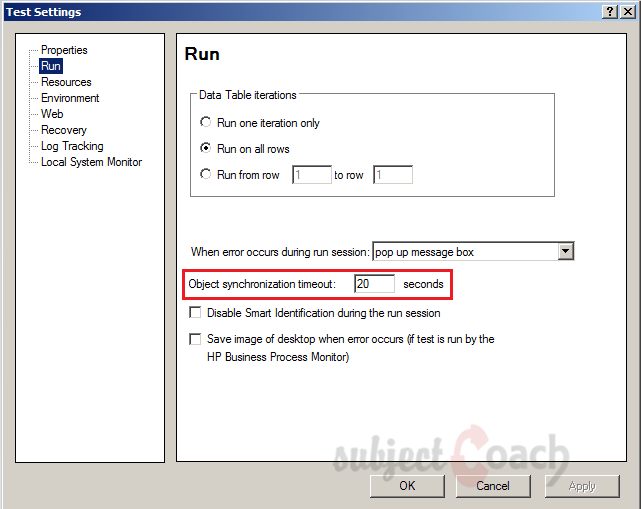Quick Test Professional - The starters Guide
Chapters
Synchronization methods
Synchronization is used to coordinate or time events to control the execution as needed. It is to give waiting time to the tool before executing next step in Test script.
Synchronization methods in QTP are:
- Exist statements
- Wait statements
- Sync Method
- Increasing Tool default synchronization time
- Inserting Synchronization points
Exist statement:
By using Exist statements we can inform QTP to wait for a window to open/element to appear. "Exist statements" return a true/false value indicating whether an object currently exists or not.

Wait statement:
Wait (n)statement waits for specified 'n' seconds.Wait ()statement without specifying the seconds by default QTP wait up to maximum time.- When we want make QTP to wait for specified time we go for Wait statement.
Example:

Sync Method:
Sync methods only applies to browser instances. It generally means to wait for the browser until the current navigation completes

To add QTP Inbuilt Synchronization:
Note: Synchronization option is disabled, if the user is not in Recording Mode.
Step 1: Get into Recording Mode and go to "Design" select "Synchronization Point”.
Step 3: Select the object, after selecting the object, the object window opens:

Step 4: Now “Add Synchronization Window" window open. Select the Property name, Property Value and Time out, click ok.

Default Synchronization:
User hasn't used any sync methods; still QTP has inbuilt Object synchronization timeout which can be used by the user.
Go to "File” select "Settings" select Run Tab, Object Synchronization Time out as shown
 '
'
Description
In this tutorial, we will get to know Quick test professional. At the time of writting QTP is at version 12.2. This tutorial is subdivided into multiple parts as shown below
- What is QTP
- Automating tests
- Environment
- Recording and Playback
- Object Repository
- Actions
- Data Table
- Checkpoints in QTP
- Synchronization
- Smart Identification
- Debugging and Error handling
- Recovery Scenarios
- Environment Variables
- Library Files
- Test Results
- GUI Objects
- Virtual Objects
- Accessing Databases
- Working with XML
- Descriptive Programming
- Automation Object Model
- A work on Frameworks
Leave your feedback for us, Feedback help us improve our tutorials.
Prerequisites
Some knowledge on Windows OS and VB Script is recommended
Audience
Students who wish to learn QTP
Learning Objectives
Learn QTP
Author: Subject Coach
Added on: 16th Mar 2015
You must be logged in as Student to ask a Question.
None just yet!